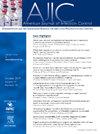Hero Program: A data-driven reward system to improve hand hygiene
IF 2.4
3区 医学
Q2 INFECTIOUS DISEASES
引用次数: 0
Abstract
Background
Healthcare-associated infections compromise patient outcomes and pose a burden on healthcare systems worldwide. Despite widespread awareness of the critical role of Hand Hygiene (HH) in preventing healthcare-associated infections, compliance among healthcare workers remains suboptimal. This study evaluates a reward program called the Hero Program which is designed to incentivize and sustain HH practices through positive reinforcement.
Methods
The program used data from an electronic HH prompting system that has been installed in an inpatient unit in Toronto Rehabilitation Institute - University Health Network for 3 years. A scoring algorithm was implemented to weigh individual HH compliance rates, considering workload and rewarding consistency. Daily winners were selected based on their scores and received gift card rewards.
Results
The analysis of data from 61 caregivers and more than 566,000 records for approximately 2.5 years indicates that the Hero Program led to an 11.45% increase in HH compliance after 120 days of implementation. This is a promising finding, suggesting that the program was effective in promoting behavior change early on. Compliance rates continued to improve over time, reaching 94% 1 year later.
Conclusions
This sustained improvement suggests that the program had a long-lasting positive impact on HH practices in the unit.
英雄计划:数据驱动的奖励系统,以改善手卫生。
背景:医疗保健相关感染(HAIs)损害患者预后,并对全球医疗保健系统造成重大负担。尽管人们普遍意识到手卫生在预防HAIs中的关键作用,但卫生保健工作者的依从性仍然不够理想。本研究评估了一个名为“英雄计划”的奖励计划,该计划旨在通过正强化来激励和维持适当的HH实践。方法:该项目使用电子手卫生提示系统的数据,该系统已安装在多伦多康复研究所-大学健康网络的住院病房超过3年。考虑到工作量和奖励一致性,实现了一个评分算法来衡量个人HH遵守率。每天的获胜者都是根据他们的分数选出的,并获得礼品卡奖励。结果:在大约2.5年的时间里,对61名护理人员的数据和超过566,000条记录的分析表明,英雄计划在实施120天后,使HH依从性提高了11.45%。这是一个很有希望的发现,表明该项目在早期促进行为改变方面是有效的。此外,随着时间的推移,依从率继续提高,一年后达到94%。结论:这种持续的改善表明该计划对该单位的HH实践产生了持久的积极影响。
本文章由计算机程序翻译,如有差异,请以英文原文为准。
求助全文
约1分钟内获得全文
求助全文
来源期刊
CiteScore
7.40
自引率
4.10%
发文量
479
审稿时长
24 days
期刊介绍:
AJIC covers key topics and issues in infection control and epidemiology. Infection control professionals, including physicians, nurses, and epidemiologists, rely on AJIC for peer-reviewed articles covering clinical topics as well as original research. As the official publication of the Association for Professionals in Infection Control and Epidemiology (APIC)

 求助内容:
求助内容: 应助结果提醒方式:
应助结果提醒方式:


